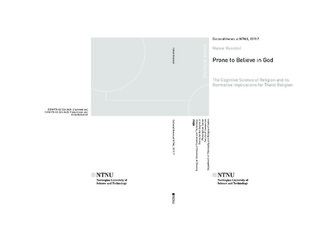| dc.description.abstract | Over hele verden danner mennesker oppfatninger om supermenneskelige aktører slik som guder, forfedre-ånder, spøkelser, engler, og demoner. I de abrahamittiske religionene jødedom, kristendom og islam finner vi et kulturelt suksessfullt gudsbegrep som handler om en mektig og moraliserende gud. Et felt kjent som «Cognitive Science of Religion» (CSR) har ambisjoner om å forklare disse fenomenene ved å kombinere evolusjonsteori, kognitiv vitenskap og antropologi. Man forsøker å forklare fremveksten av slike gudsbegreper i menneskets naturhistorie så vel som å kaste lys over religionsrelevante mekanismer og prosesser i dag. For eksempel gjelder dette studiet av hvordan menneskesinnet konstruerer gudsbegreper og danner oppfatninger om Gud.
La oss anta at dette forskningsfeltet er suksessfullt og at sentrale bidrag er sanne eller tilnærmelsesvis sanne. Hvilke normative implikasjoner har det for teisme, teistiske argumenter og teistiske oppfatninger? Avhandlingen er en detaljert undersøkelse av dette spørsmålet.
Den har tre hoveddeler.
Del en introduserer et utvalg kognitive og evolusjonære teorier om religion. Tesen argumenterer for at disse teoriene lar oss besvare det ultimate spørsmålet om hvordan menneskets mottakelighet for religion oppsto i naturhistorien. De bidrar også til å besvare det proksimate spørsmålet om hvordan personer i abrahamittiske kulturelle kontekster danner en tilbøyelighet til å tro på Gud.
Del to undersøker et utvalg teistiske argumenter og teser og argumenterer for at CSR er relevant i en vurdering av disse. Kort sagt, resultater fra dette feltet bidrar til å forsterke det ondes problem, og de har negative implikasjoner for moral-argumenter for Guds eksistens og en retning kjent som «reformert epistemologi».
Del tre argumenterer for at CSR er relevant i en epistemologisk analyse av berettigelsen til teistiske oppfatninger. Et sentralt argument er at epistemisk berettigede oppfatninger oppstår fra epistemiske dyder og at CSR gir oss grunn til å benekte at tilbøyeligheten til å tro på Gud oppfyller nødvendige betingelser for å være en epistemisk dyd. De teistiske oppfatningene subjekter er tilbøyelige til å danne er derfor uberettigede.
Avhandlingen støtter en moderat konflikt-modell for forholdet mellom vitenskap og religion. Ifølge denne modellen stemmer vitenskap og religion dårlig overens med hverandre. I motsetning til en sterk konflikt-modell hevder den moderate modellen imidlertid ikke at det i prinsippet er umulig å forsone religion og vitenskap. | nb_NO |
| dc.description.abstract | Summary
All over the world people form beliefs about superhuman agents such as gods, ancestor-spirits, ghosts, angels, and demons. A culturally successful god-concept is found in the Abrahamic religions, Judaism, Christianity, and Islam. This concept involves the notion of a powerful, moralizing deity. A field known as the “Cognitive Science of Religion” (CSR) purports to explain these phenomena by combining evolutionary theory, cognitive science, and anthropology. Scholars in this field focus on the origin of god-concepts in human natural history and on the nuts and bolts of religion today, such as processes by which the mind constructs god-concepts and forms religious beliefs.
Let us suppose that this enterprise is successful and that central contributions are true or at least approximately true. What normative implications does that have for theism, theistic arguments, and theistic beliefs? The thesis is a detailed investigation of this question.
It has three main parts.
Part one introduces a selection of cognitive and evolutionary theories of religion. The thesis argues that these theories allow us to explain, ultimately, how the human susceptibility to religion arose in natural history. Moreover, they contribute to explaining, proximately, how subjects in Abrahamic cultural environments become prone to believe in God.
Part two looks at a selection of theistic arguments and theses and argues that CSR is relevant in an assessment of these. In short, results from this field strengthen the problem of evil, and they have negative implications for moral arguments for the existence of God and a position known as reformed epistemology.
Part three argues that CSR is relevant in an evaluation of the epistemic status of theistic beliefs. A central argument is that epistemically justified beliefs arise from epistemic virtues and that results in CSR provide grounds to deny that the propensity to believe in God meets necessary conditions for being an epistemic virtue. The theistic beliefs subjects are prone to form are therefore unjustified.
The thesis supports a moderate conflict model concerning the relationship between science and religion. According to this model, science and religion do not hang well together. However, in contrast to a strong conflict model, the moderate model does not hold that it is in principle impossible to reconcile science and religion. | nb_NO |
